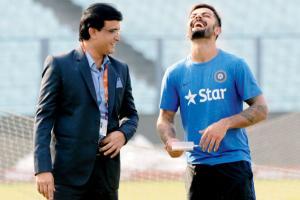Centrally-contracted players are essentially BCCIs employees. Their well-being, progress and workload has to be managed by the Board

Sourav Ganguly with Virat Kohli. Pic/AFP
Sourav Ganguly was India captain in October 2004 when the first-ever annual central player contracts were introduced in Indian cricket. The signing of the contracts on the sidelines of the India v South Africa Test in Kolkata marked the end of a seven-year struggle to get an annual retainer in place for the elite cricketers.
ADVERTISEMENT
Discussions actually started in 1997, when former BCCI General Manager, Prof Ratnakar Shetty was on tour in Sri Lanka as team manager. The real push came for it in 2000-01 when a clutch of senior pros including Ganguly, Rahul Dravid, Anil Kumble, Sachin Tendulkar and Javagal Srinath got together. Kumble and Dravid led the discussions from the players' side. The major reason behind the contracts being introduced was to provide a sense of security to the players so that irrespective of them being injured there was a sense of stability in terms of their income.
As with everything else in cricket, India was late to introduce this system. Australia and South Africa as always was the first off the blocks. But the country where the contracts proved to be the biggest game changer was England. In 1999-2000, when English cricket was at its absolute nadir, new captain Nasser Hussain along with coach Duncan Fletcher managed to get a string of reforms to change the story. Then England and Wales Cricket Board (ECB) chairman Lord Ian MacLaurin demanded a few assurances from Hussain before pushing for central contracts.
Counties commitments
Before the contracts were introduced on March 4, 2000, English players were forever wedded to playing for their counties in between their international engagements. "Before central contracts, everyone turned up as county players—they might be there next game, might not be,'' Hussain told British newspaper The Daily Mail.
"Once central contracts were in, though, your main team was the England cricket team. People might ask, "What difference does that make when you're playing for your country?" But when you know you are playing for a team and you know your teammates, you can create so much more in terms of bonding and morale," Hussain added.
The central contracts provided a sense of security to the English team. As per the newspaper, the Test winning percentage from 1980-2000 increased from 22 per cent to 45 per cent after the central contracts were introduced.
Today, an English international's county engagements are determined by a team led by the Managing Director men's cricket and the coaching staff. The role of Managing Director is performed by former left-arm spinner Ashley Giles, who replaced former captain Andrew Strauss in that role. Essentially, Giles is the boss of England's men's teams in all formats and age-groups. The reason for narrating this example of English players and their contracts is the stark correlation which stares at us in India too.
Disastrous World T20s
Back in 2009 and 2010 when the World Twenty20 campaigns ended in a disaster, we all remember the outrage that followed because the then head coach Gary Kirsten made references to the IPL schedule affecting the players. In 2011, right after the World Cup win, India's top players Virender Sehwag and Zaheer Khan played the IPL through injuries. They delayed their surgical procedures and that had a ripple effect on India's tour to England that followed later that year in July. Centrally contracted players are essentially BCCI's employees. Their well-being, progress and workload has to be managed by the Board. This policy of leaving it up to the players to decide on whether they want to play or not is unworkable in India. That's where BCCI needs a full-time Director of Cricket who can be the final decision-making authority who can step in, because the selectors themselves will never take this call.
Workload management
We have some of our best bets for the upcoming Australia tour putting their body on the line in the IPL. The franchises have every right to demand more than 100 per cent from their picks. It is here that the Board needs to enter and manage the workload.
In recent years, only Ravichandran Ashwin, Murali Vijay and KL Rahul among contracted players have felt secure enough to miss an entire season of IPL in 2017. It is too much to expect the Board to tell franchises to play the contracted players for just a certain number of games. It might be better off for the key players to be given an entire season a miss with Board's support. After all, the centrally contracted players are key to India's success in key overseas tours and ICC events.
If anyone can get this done, it is Ganguly as BCCI president. After all, he was the captain when contracts were first introduced. Now, he needs to get a Director of Cricket to be the bridge and put a system in place to protect our best players.
Keep scrolling to read more news
Catch up on all the latest sports news and updates here. Also download the new mid-day Android and iOS apps to get latest updates.
Mid-Day is now on Telegram. Click here to join our channel (@middayinfomedialtd) and stay updated with the latest news
 Subscribe today by clicking the link and stay updated with the latest news!" Click here!
Subscribe today by clicking the link and stay updated with the latest news!" Click here!







